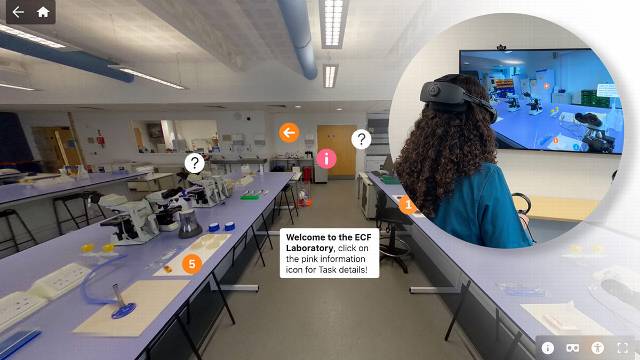Pursuing a Masters’ degree is often born of a particular passion that a student wants to explore more in depth than an undergraduate degree can offer. This was true for Graham Smith, who studied biology before deciding to specialise in the world of entomology at Harper.
Having completed his undergraduate studies, Graham signed up to a week-long programme with the Fields Study Council BioLinks project, bringing together people with a shared passion for biology and a particular interest in nature to work on biological recording. With Graham’s background studies, he was knowledgeable on the subject but also ready to be challenged. He commented: “It was one of the rarer opportunities for a whole bunch of keen young naturalists to bump heads, all from a range of backgrounds.
“One of the most beautiful things I have found about invertebrates and the natural world is that you get to be put back in touch with a child-like part of yourself; marvelling at things that are beautiful or don’t make sense – something we start to lose touch with as we become more cynical with age. That was especially apparent here on the course.
“All at varying levels of experience and confidence we had an endless curiosity and fun facts to share, all while conveying genuine passion. No elitism crept in; it felt like everyone truly wanted to impart their knowledge and were excited by that prospect.”
With this new found interest, Graham followed up the experience by finding out where he could learn more about the world of invertebrates. This led him to Harper, as recommended by a professor at his undergraduate university and Dr Sarah Beynon from The Bug Farm, where a postgraduate degree spoke to his academic needs.
Graham said: “I wanted to continue onto postgraduate level as I am interested in pursuing research and asking questions, especially in an area where there is so much to ask. More than anything I wanted to gain enough in-depth knowledge about insects in particular in order to feel prepared for studying their little but complex world as I move forward.
“On the open day everyone running the course was warm and welcoming and accommodating of all my questions. I came away and I felt that postgraduate-level and a masters specifically tailored towards learning about insects was the best way to accomplish my career aspirations.”
Now studying MSc Entomology, Graham is putting his passion into action, striving to learn. He shared: “During my studies I think the most inspiring thing I have discovered is how curious and hopeful so many people are and can be in this field of research, and how well-connected everyone is in the field of Entomology.
“In a time where we need to share ideas and act fast to make a difference it is lovely to see what feels like an extended family of passionate people. It is also inspiring to see insects slowly getting more attention in the mainstream media, and despite the initial knee-jerk negative perception of many insects the average person is willing to listen and learn about them more than I ever expected.”
Over the course of his postgraduate studies, Graham has been working on his dissertation paper. He explained: “My research project is on solitary bees, specifically ground-nesting bees in a Kent orchard.
“I collected data on the flower resources and habitat types surrounding man-made plots - bare soil patches - in which they have been allowed to nest for a few years. The aim is to investigate how important these factors are in encouraging these native pollinators to orchards, as native bees may offer a critical alternative to honeybees for improving crop yields in future.
“As the project is still ongoing I don't know what the results will be or whether the aims have been met yet but I am hopeful the study will reveal something of importance. Especially as unlike honeybees it is difficult to breed solitary species in captivity, so providing space and the right conditions in the field for them to nest in large numbers will be critical for orchard pollination by these species.”
As Graham continues his work, his enthusiasm has not waned, and advises others with a keen interest in a subject to take up the mantle and continue into higher education. He said: “The advice I would give to anyone else studying a postgraduate degree is to make the most of the connections you will have while on your respective course - there will be someone who is interested and passionate about what you are! Or at least there will be someone who knows people who are, so seize that opportunity when you can!”
You still have time to seize the opportunity of starting your postgraduate studies with us this September. Explore our courses and find the degree that matters to you or get in touch on 01952 815000 or complete our call back form to kickstart your studies today!

 Blog: Veterinary Medicine students step into immersive 360° laboratory
At Harper & Keele Veterinary School, students are stepping beyond the traditional microbiology bench and into an immersive 360° labo …
Posted
Yesterday
Blog: Veterinary Medicine students step into immersive 360° laboratory
At Harper & Keele Veterinary School, students are stepping beyond the traditional microbiology bench and into an immersive 360° labo …
Posted
Yesterday





